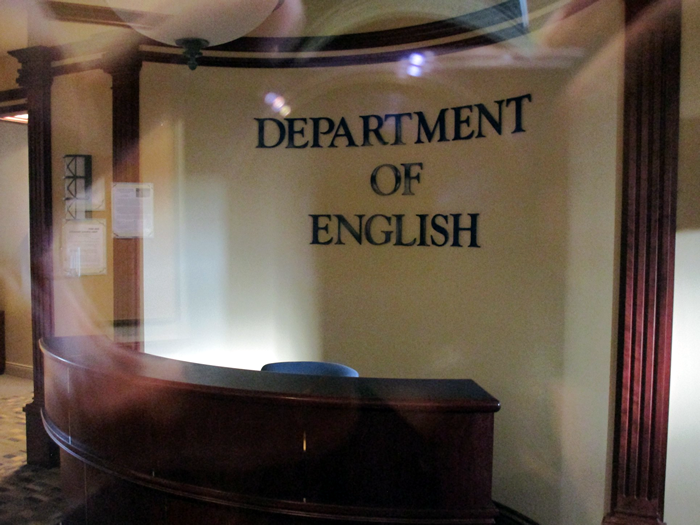
I have long joked that I’m the least educated person I know. It’s not true, of course – I’ve spent most of the last decade working with college students who, by definition, have less education. And there are a few of my high school and college peers who haven’t gone on to pursue graduate work either. It’s also a joke because of how much of my life has been focused on academic achievement and intellectual development, though lately more the latter than the former (see the old saw from Twain about not letting your schooling get in the way of your education).
Sometime late last year, just after I got married, I got the idea to go back to school. I’d always said that I would only return to formal education if there was something I really felt it could facilitate that there was no alternative way of getting. And while technically one can become a writer without the Masters in Fine Arts (MFA) in Creative Writing, the path without it seems increasingly arduous as an American aspiring writer. More and more, agents and publishers seem to be prompting the purveyor of the unsolicited manuscripter to name-drop who they studied with, to discuss their workshops and academic background. For someone who always felt that the best writer’s resume looked more like Peter Høeg’s than an academic’s (“Before becoming a writer, he worked variously as a sailor, ballet dancer and actor [in addition to fencing and mountaineering]”), this was hard to swallow.
On the other hand, however, as a friend and wedding guest put it, “they pay you to write for years, which you want to be doing anyway!” And, of course, as someone who’s spent about a third of his career in debate coaching at the college level, the notion of a long-term teaching post at a university is not unpalatable and probably eventually requires a Master’s degree of some kind, at the very least.
Thus began the rather frenzied process of preparing to apply to 17 (seventeen) MFA programs in Creative Writing. A number of criteria were selected, not least of which was a snowier climate that would provide relief from the years of heat, humidity, and attendant bugs so comprehensively supplied by New Orleans, Louisiana. I applied in fiction and in non-fiction, I submitted long pieces and short pieces. I railed in frustration that my assumption that I could submit a whole book as an MFA application had been woefully wrong (MFA programs get metric tons of applicants and who wants / has time to read all that?). I selected and re-selected pieces, wrote a new story to submit to a lot of places, revised more than ever.
I took the GRE, almost cancelled my scores out of concern for the first essay, and laughed out loud when I saw the score I almost cancelled (and even harder when I saw the writing score come back later). And I checked the box at the end of the GRE that said I was open to solicitations from graduate programs, specifying very clearly that I was interested and only interested in MFAs in Creative Writing.
Oops.
Ever since, to this very day as I continue to play unsubscription whack-a-mole, I have been inundated with endless solicitations from MBA programs. B here not standing for Book, of course, but Business. Somehow, countless accredited universities think that those who are exclusively interested in MFA programs where they go and write a book in two or three years can easily be persuaded to ditch that dream for America’s siren call of entrepreneurial spirit.
In a way, it almost makes sense. It’s like the bad jokes about one’s father (not my father) shaking his child by the shoulders and asking how they can eat their dreams and telling them to major in something real (irony about the surreality of American capitalism as an unobserved bonus!). Maybe the rejection rates are so high in MFA programs that everyone applying to them is sorted into the same bin as MCAT takers who just scored a 480: you don’t know what’s best for you, but we do! Maybe business schools feel that it’s inevitable that everyone, no matter their interest, must eventually get their MBA because everything in the nation is being run like a business, or aspiring to. (Now including the nation itself!)
Of course, I also got a good number of invitations to law school, which is slightly confusing given that the GRE is not the primary test one takes to pursue a JD. (I got zero medical school solicitations, obviously.) Here, the inevitability of law school feels more poignant as someone who has spent so much time in and around academic debate, wherein I meet tens of people who seemed to choose law school out of sheer inertia (and many more who avidly pursued it).
There were also some related invitations that I could at least imagine where they were coming from, like Communications departments (I’ve actually considered a Master’s in this to pursue a permanent debate/teaching post) and English PhDs. Most fascinating of all, however, were the numerous programs that advertised that I could apply without submitting my GRE scores. Which is just proof that, despite these solicitations being based on reporting of GRE scores, no one is paying attention or minding the store. Not to put too fine a point on it, but after I got my scores, I went from kind of deprioritizing MFAs that required the GRE to seeing if there were more I could add to my list. It did not fill me with relief that I could attend the William Jefferson Clinton School of Public Service at the University of Arkansas without submitting my GRE scores.
I did take it as a minor point of pride that a couple of Accounting programs really went after me, because it was a testament to my math scores being not that bad. Of course, the reality is that none of these programs probably looked at my scores at all… they merely saw that I was okay receiving solicitations and began flinging electronic spaghetti noodles my way as fast as their keyboards would allow.
Still, MBAs were the most. I think I only got one or two solicitations from bona fide actual MFA programs in Creative Writing. Because, y’know, the competitiveness and the mountains of reading and such.
You can’t blame these folks for their tenacity, I suppose. After all, in America, everything really is a business – even writing, as many literary agents hasten to stress on their websites. In the future, we will all be issued little LLC licenses with our birth certificates, Social Security numbers, and tracker chips. Corporate personhood was a great start, but now we must also have personal corporatehood. As the ascendant corporatist power structure continues to ingest and digest vestiges of the American state like a particularly voracious monitor lizard, we can imagine a time when our only rights will derive from adherence to (and importance within) some sort of corporate playing field. Rights are not endowed by a creator or enshrined by a state, they are gifted to you as fringe benefits by the almighty CEO! Perhaps I really should ditch Plan A and master business administration before it masters me!
Regardless of the long-term future that awaits us all, I am quite thrilled by the prospects my short-term future is laying out. My MFA application process was laden with the relentless rejection that defines seemingly every aspect of the writing life, so I was most relieved and excited to finally sign on the unbroken line with West Virginia University, a school that boasts 29,000 students in a town of 30,000 (it’s quiet here in the summer!). West Virginia is the ninth state for me to call home (if you count DC as a state, which we all should) and Morgantown is the twelfth place I’ve lived. WVU will, prominently, be the fourteenth school (eleven of these were before high school) I’ve attended and the second where I’ve taught (two sections of English 101, bright and early thrice weekly).
So far, Morgantown is quite striking to look at but profoundly less friendly than New Orleans, which is a bit like saying someone is much less soft-spoken than Mr. Rogers. There is a wary quietude and reservedness that pervades the people here, possibly more the product of my long hair and outgoing greetings than anything innate about the locale. The other day, Alex noted that West Virginia feels more like the South than New Orleans ever did, speaking I think to a particular perception of the Trumpian South and echoing comments made by Facebook friends earlier on how NOLA is in no way the real South. (Though, notably, Morgantown is, like New Orleans, the blue oasis in a very red state.) It is both less diverse than New Orleans and more diverse than the statistics led me to believe, the latter of which has been some small comfort. Rent is cheap. Bridges are everywhere. No two buildings have the same exact elevation (our neighbor’s driveway starts at the same road but ends up three feet lower than ours).
I already miss New Orleans. I miss the Quarter in full throe on a Saturday night, I miss the enveloping wet heat, I miss the trees uprooting sidewalks and the potholes large enough to swallow that midnight opossum sauntering across the asphalt. But then, I miss San Francisco too, and Boston, Albuquerque, the north coast of Oregon, even New Jersey. I miss a Nevada I barely knew and a central California I’d sooner forget. And more than that, I miss the people in all those places and wildly, haphazardly beyond.
You’ll never find the next person to miss unless you move. And then what would you even have to write about?


